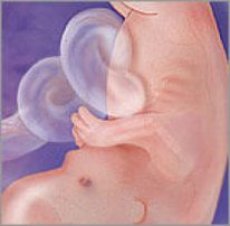Medical expert of the article
New publications
Pregnancy: 11 weeks
Last reviewed: 08.07.2025

All iLive content is medically reviewed or fact checked to ensure as much factual accuracy as possible.
We have strict sourcing guidelines and only link to reputable media sites, academic research institutions and, whenever possible, medically peer reviewed studies. Note that the numbers in parentheses ([1], [2], etc.) are clickable links to these studies.
If you feel that any of our content is inaccurate, out-of-date, or otherwise questionable, please select it and press Ctrl + Enter.

How the child grows:
Your baby is now over 4.5 centimeters long and almost fully formed. His hands are clenching into fists, tiny teeth are starting to appear under the gums, and some bones are starting to harden.
The baby begins to actively move and stretch. These movements will become more frequent as his body grows and becomes more developed and functional. You will also be able to feel the baby hiccup as the diaphragm forms.
Important: Each baby's development is unique. Our information is designed to give you a general idea of fetal development.
Changes in the expectant mother
You're probably feeling more energetic now, and nausea isn't as common. Unfortunately, you may also be suffering from constipation, which is caused by hormonal changes that can slow down digestion and cause heartburn.
Don't worry if you haven't gained weight yet because of the nausea. Your appetite will soon return and you'll start gaining about 1 pound per week.
Find out which of your symptoms are normal and which require an unscheduled visit to the doctor. You may also be interested in safe cold medications and whether you can continue your dance classes.
3 Questions About... Safe Foods During Pregnancy
You've probably heard a lot of warnings about dangerous foods during pregnancy. While some of them do pose potential risks to the baby, most are safe and the risk of developing complications from the foods is very low.
- What foods should you avoid during pregnancy?
Some seafood may be unsafe because it may contain methylmercury, a substance that is potentially harmful to a child's developing brain. On the other hand, seafood has benefits: it is a rich source of protein and omega 3 fats.
To minimize exposure to methylmercury, the Food and Drug Administration advises avoiding shark, swordfish, king mackerel, and scallops. Some experts recommend avoiding tuna in any form other than canned.
Also, do not eat fish caught by yourself from a nearby body of water. First, make sure that the water from this body of water does not contain dangerous pollutants and mercury. And finally, do not eat raw or undercooked fish (including raw smoked and salted fish) during pregnancy. It may contain bacteria and parasites that can harm you and your baby.
Foods to avoid also include unpasteurized soft cheese, raw or undercooked meat and poultry, and foods that contain raw eggs.
- What drinks should you avoid during pregnancy?
Alcohol is the number one no-no during pregnancy. It passes quickly through your bloodstream to your baby, and even one drink a day can increase your risk of illness. There is no safe amount of alcohol during pregnancy, so it’s best to avoid it altogether. Other drinks to avoid include unpasteurized juice and milk, as well as eggnog drinks with sugar and alcohol. There’s a risk that these drinks may contain E. coli and other bacteria that could be harmful to you and your baby.
Regarding caffeine, after many years of controversy, the results of the latest research show that moderate amounts of caffeine are not harmful to the baby, while abruptly stopping it will cause discomfort. Remember that caffeine is found in chocolate, tea, cola and many other soft drinks. This information will help you to calculate the amount of caffeine you consume.
- How to protect yourself from food poisoning?
- Cook meat, poultry and fish until fully cooked.
- Do not eat raw meat, fish and pates.
- Do not leave uneaten food for a long time. Reheat it before eating.
- Store raw meat separately from other foods.
- Wash or peel fruits and vegetables thoroughly.
- Wash your hands thoroughly with soap after touching any unwashed food; raw meat, poultry, seafood or eggs.
- Do not leave perishable foods in the refrigerator.
This week's activity: Reach out to other moms - including your own. Women who have experienced motherhood to the fullest can offer good advice and support.


 [
[